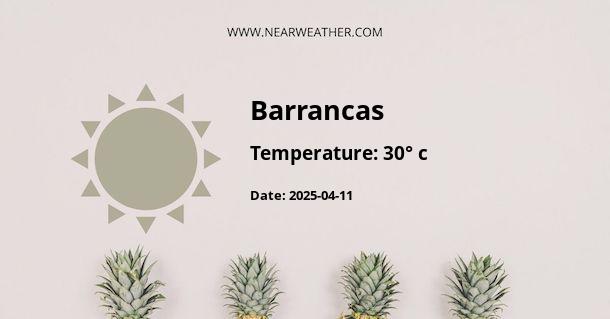Climate and Weather in Barrancas, Colombia
Barrancas, located in the La Guajira Department of Colombia, experiences a unique climate that is influenced by its geographical location and topographical features. The town sits near the Caribbean coast and the Sierra Nevada de Santa Marta mountain range, contributing to its distinct weather patterns. Understanding the climate and weather in Barrancas is essential for residents, travelers, and businesses operating in the region.
Annual Weather Overview
Barrancas features a tropical savanna climate, characterized by distinct wet and dry seasons throughout the year. The town experiences consistently warm temperatures, with minimal variation across seasons.
| Month | Average High (°C) | Average Low (°C) | Precipitation (mm) |
|---|---|---|---|
| January | 33 | 23 | 2 |
| April | 33 | 24 | 26 |
| July | 33 | 24 | 26 |
| October | 33 | 24 | 48 |
| December | 33 | 23 | 2 |
Source: World Weather Online
Barrancas experiences minimal temperature fluctuations throughout the year, with average highs around 33°C and average lows around 23-24°C. The town receives the majority of its precipitation during the transitional periods between wet and dry seasons, notably in April, July, and October.
Wet Season
The wet season in Barrancas typically occurs from September to November, characterized by increased rainfall and humidity. This period may experience occasional thunderstorms and heavy downpours, contributing to the region's unique ecosystem and supporting agricultural activities. The wet season brings lush greenery and supports the growth of various crops.
Dry Season
The dry season, spanning from December to March, showcases minimal precipitation and clear skies. Barrancas experiences lower humidity levels during this period, making it an ideal time for outdoor activities and tourism. The consistent warm temperatures make the town an attractive destination for travelers seeking sunshine and relaxation.
Impact of La Niña and El Niño
Barrancas, like many regions in South America, can be influenced by climatic phenomena such as La Niña and El Niño. La Niña events may lead to increased rainfall and cooler temperatures, impacting agricultural activities and local ecosystems. Conversely, El Niño events can result in drier conditions and warmer temperatures, affecting water resources and crop yields. It's essential for residents and businesses in Barrancas to monitor and adapt to these climatic variations.
Wind Patterns
Barrancas experiences consistent wind patterns, with the trade winds from the northeast contributing to its climate. The town's proximity to the Caribbean Sea influences its breeze and airflow, providing relief from the tropical temperatures and enhancing the overall comfort of the region.
Weather Resilience
The residents and infrastructure in Barrancas are accustomed to the town's distinct climate and have adapted accordingly. Traditional architecture, agricultural practices, and local livelihoods often align with the prevailing weather patterns. As global climate change continues to impact regions worldwide, including Colombia, efforts to enhance weather resilience and sustainable practices are increasingly important for Barrancas and its inhabitants.
In conclusion, Barrancas, Colombia, boasts a tropical savanna climate with minimal temperature variations and distinct wet and dry seasons. Its unique geography and environmental influences contribute to a consistent and warm climate year-round, making it an attractive destination for travelers and a vital region for agricultural activities. Understanding the weather patterns and climate resilience in Barrancas is essential for effectively managing the town's resources and supporting its communities.
A - Barrancas's Latitude is 10.957560 & Longitude is -72.787689.
A - Weather in Barrancas is 30° today.
A - Climate Conditions in Barrancas shows overcast clouds today.
A - Humidity in Barrancas is 63% today.
A - Wind speed in Barrancas is 6.08 km/h, flowing at 236° wind direction. today.
